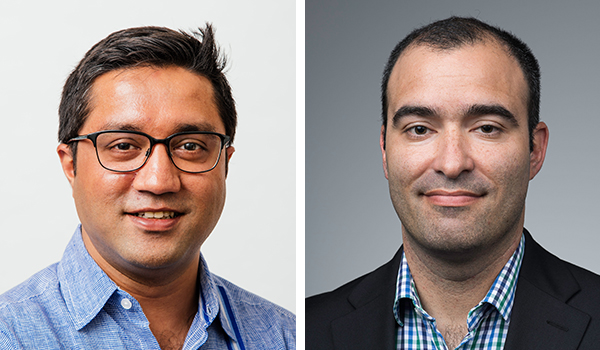How do you make sense of the millions, even billions of data points that represent the interactions of neurons across the human brain? Or the movements of people as they navigate the transportation network of a major city? Or the rates of COVID-19 infections and hospitalizations as they surge in some parts of the country, but not others?
Such complex systems are an important focus for Gourab Ghoshal and Gonzalo Mateos, the University of Rochester’s newest recipients of data science fellowships funded by University Trustee Stephen Biggar ’92 and his wife, Elisabeth Asaro-Biggar ’92.

The awards support tenured or tenure-track Arts, Sciences & Engineering faculty researchers who use data science methods to frame, analyze, and resolve pressing issues in their fields. The fellowships, which carry a term of three years, help the University recruit and retain talented researchers in the rapidly growing and competitive field of data science.
Ghoshal, a recently tenured associate professor of physics and astronomy with joint appointments in computer science and mathematics, will serve as the Stephen Biggar ’92 and Elisabeth Asaro ’92 Fellow in Data Science. One of the University’s first targeted hires in the specific area of data science, Ghoshal explores the theory and applications of complex networks in physics, the social sciences, and other dynamic systems.
For example, using GPS location tracking, check-ins on apps like Foursquare, geocaching from Twitter posts, and, under some circumstances, call data records from cell phones, Ghoshal’s lab finds patterns in human mobility, traffic, and disease progressions with greater accuracy and precision.
He is also collaborating with Andrew White, assistant professor of chemical engineering, on a National Science Foundation grant to create a mathematical model that will monitor the spread of COVID-19—modeling the effective transmissibility of the disease at any given time, independent of how many people actually have it—to help policymakers make informed decisions about reopening.
Mateos, a recently tenured associate professor of electrical and computer engineering, will serve as the Asaro Biggar Family Fellow in Data Science. Considered a rising star in his field, Mateos and his lab pursue research interests in statistical learning from big data, network science, optimization, and signal processing, work that has applications for networked systems, including the internet, power grids, the brain, and social networks.
He received a National Science Foundation CAREER award, a national recognition of promise for a young researcher. In 2016, he received pilot funding from the University’s Goergen Institute for Data Science in collaboration with Alex Paciorkowski, assistant professor of neurology, to develop software to help predict which treatments are likely to have the best outcomes for epilepsy patients.
Both Ghoshal and Mateos have been actively engaged with the Goergen Institute. Currently they each serve as a cochair of one of the institute’s research working groups.
The inaugural Stephen Biggar ’92 and Elisabeth Asaro ’92 Fellow in Data Science was Amanda Larracuente, assistant professor of biology. The inaugural Asaro Biggar Family Fellow in Data Science was Ehsan Hoque, assistant professor of computer science and former interim director of the Goergen Institute for Data Science.


